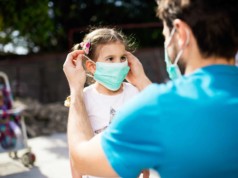Pregnancy is shared into 3 sets of three months called the first trimester, the second trimester, and the third trimester. The second trimester of pregnancy normally begins during week 13 and ends by week 27.
For most pregnant women, the second trimester often marks the end of several unpleasant symptoms that they experienced in the first trimester. These symptoms may include morning sickness and breast tenderness.
However, the second trimester might come with its own batch of symptoms, such as bold changes in your skin, gums, and even vision. Nevertheless, you have no reason to worry as most of these changes are very temporary and will eventually go away after childbirth.
Skin Changes
Stretch Marks
As your belly begins to expand with your growing baby, you may start to notice red, sliver, or purple marks on your skin. These strange lines are known as stretch marks. Stretch marks often occur when your skin starts to grow too quickly, and the fibers in your skin begin to tear.
When these marks first develop, they are usually purple or red. This is mostly because the blood vessels in the dermis are beginning to show. Your stretch marks may fade after delivery, but don’t count on it as it can be quite difficult to completely get rid of them all.
Skin Darkening
Many women deal with skin darkening during the second month of their pregnancy. Experts are yet to know precisely why that happens. Some people are lead to believe that this skin darkening occurs because of increased levels of estrogen.
Naturally, progesterone and estrogen stimulate the pigment-producing skin cells to produce more melanin. But the production of melanin doesn’t occur uniformly.
You may only notice skin darkening on your body in a couple of places, including:
- On your nipples and around them
- Around the navel, or belly button
- In the area between the vulva and anus, called the perineum
- In the armpits
- On the inner thighs
- On the face, (this is a condition known as chloasma)
Skin darkening during pregnancy and at other times is made worse by sunlight. This is why you must use a sunscreen with an SPF of no less than 15. The darkened skin is not a reason to worry as it will often fade after your baby is born.
However, If you notice that it remains, your doctor can prescribe an ointment that will help to lighten the discoloration.
“Glowing” Skin
Every woman wants clear and glowing skin, but it is most achievable during pregnancy. This is usually caused by an increased blood volume, which often peaks during the second trimester. You may notice these changes in places that contain a lot of blood vessels, like your face.
Oily Skin and Increased Perspiration
When you’re pregnant, all of your glands will naturally begin to work harder. You may notice that you have a more oily complexion, and you also sweat a lot more. You may even start to experience acne due to the excess production of oil.
Make sure that you are only cleaning your skin or face with mild scrubs and soaps.
Spider Veins
Spider veins are often caused when there is an increase in hormones, thus causing a higher volume of blood to travel through a pregnant woman’s veins.
The veins are very tiny blood vessels that lay just below the skin’s surface. During pregnancy, when there is an increased flow of blood, they become much easier to see. Some spider veins will eventually go away, and others will remain.
If you feel like they bother you after childbirth, dermatologists can help you get rid of them through a process called sclerotherapy.
Heat Rash
A lot of women will also experience heat rash. This happens when blocked sweat ducts have your sweat trapped under your skin. The rash will often appear as red, mostly itchy, and inflamed skin.
You may notice it in open areas, but there are greater chances of having it under skin folds like under your breasts and your armpits.
You can try to keep heat rash at bay by avoiding hot baths and showers. Applying cornstarch after fresh bathing can also help you soothe heat rash.
Itchy and Sensitive Skin
It is not uncommon for pregnant women to notice itchy and red skin on the planet of their hands and soles of your feet. The skin around a pregnant woman’s abdomen may also become sensitive and itchy, especially in areas where it’s the most stretched.
You may be able to manage this condition by merely avoiding scratching and rubbing on moisturizer.
Blotchy Skin
You may see your skin getting red or blotchy when you’re feeling cold. This will commonly develop on the legs and feet.
Skin Tags
Small skin tags are simply growths of skin that mostly appear under your breasts or arms. They will often go away on their own, but can also be removed by a doctor if they don’t go away naturally.
New Moles
You will most likely develop new moles while you are expecting a baby. These are not the ones that should make you panic as they are not likely to become cancerous. However, it’s is not a bad idea for you to show your doctor any new moles.
Vision Changes
Your vision may feel worse, and your eyes may also feel drier than usual during your pregnancy. These are some of the expected changes in response to raging pregnancy hormones.
You have to contact your doctor when you begin to notice any changes to your vision, such as blurriness or dimming. If you experience spots, double vision, or floaters, do not hesitate to contact your doctor.
These symptoms may indicate a severe medical condition.
Gum Changes
When it comes to pregnancy changes, your gums are not left out. Pregnancy hormones will cause your gums to become swollen, more sensitive, and likely to bleed, mostly after flossing and brushing.
Gingivitis and Tooth decay, or gum inflammation, are also more likely to occur or worsen when you’re pregnant. For these reasons, you must take care of your teeth.
Below are a few things you can do at home to maintain good oral health while pregnant:
- Brush softly
- Use a soft-bristled toothbrush
- Brush frequently and regularly after every meal
- Floss at least once a day
- Avoid sweets
- Rinse with an antibacterial mouthwash
- Eat plenty of foods rich in vitamin C, such as fruits and vegetables
You may also notice that you have tiny tender nodules on your gums. These nodules are called pyogenic granulomas (pregnancy tumors). While they may bleed and even hurt, they’re usually nothing to be worried about.
These are not cancerous and will usually go away after the birth of your baby. Your dentist can easily remove them if you feel bothered.
The final thoughts
Pregnancy is one of the most exciting and probably stressful times of a woman’s life, but they come with a bundle or more of joy to show for it. Some of the changes you will experience are not enough to cause worry, but it is OK to talk to your doctor if you feel bothered.
It is essential to pay attention to bodily changes and also do the bit you can to maintain good health. Rest, exercise, and eat healthily.











